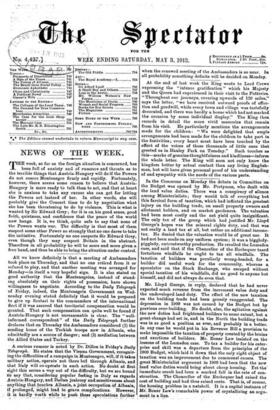Mr. Lloyd George, in reply, declared that he had never
expected much revenue from the increment value duty and the undeveloped land duty. The effect of the new taxation on the building trade had been grossly exaggerated. The depression in 1909 was not caused by the Budget but by previous over-building. No doubt, also, the agitation against the new duties had frightened builders to some extent, but a great change had set in, and in the North the building trade was in as good a position as ever, and probably in a better. In any case he would put in his Revenue Bill a provision to make impossible the taxation of property created by the brains and exertions of builders. Mr. Bonar Law insisted on the lessons of the Lumsden case. To tax a builder for his enter- prise and skill was a departure from the principles of the 1909 Budget, which laid it down that the only right object of taxation was an improvement due to communal causes. The great Ministerialist argument in 1909 had been that the new land value duties would bring about cheap housing. Yet the immediate result had been a marked fall in the rate of con- struction. The Chancellor of the Exchequer had raised the cost of building and had thus raised rents. That is, of course, the housing problem in a nutshell. It is a capital instance of Mr. Bonar Law's remarkable power of crystallizing an argu- merit in a line.


















































